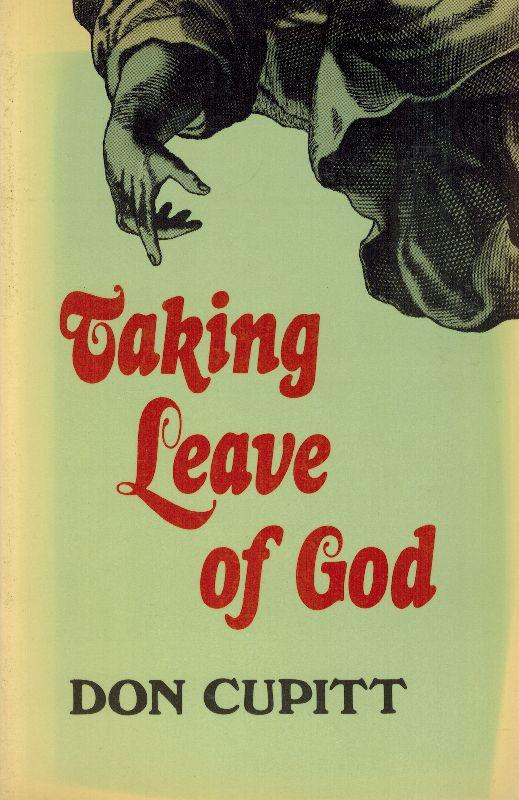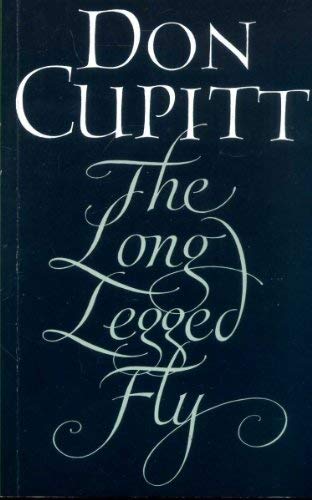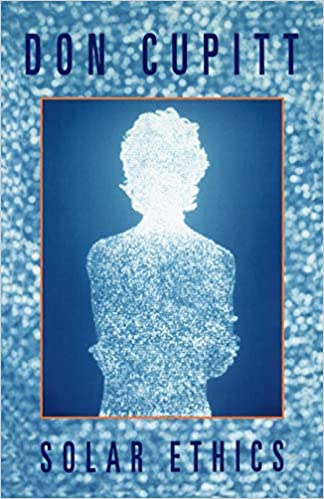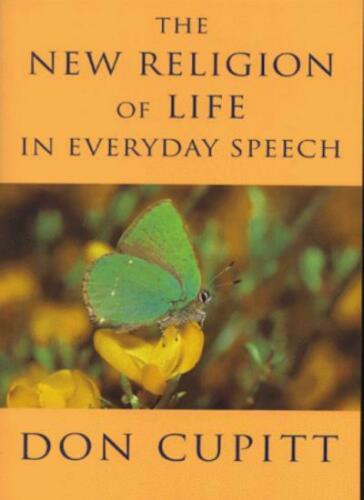Selected by Elaine Graham & Graeme Smith
Here, we present five of Cupitt’s most important works, representing the most significant phases of his thought. They mark his progress from an initial advocacy of theological non-realism, to the influence of the philosophy of language and post-structuralism, to his embrace of a more expressivist and existential form of religious life, which he termed ‘solar ethics’, to his final interest in the spirituality of everyday life and speech.
1. Taking Leave of God, 1980

The publication of this book marked Cupitt’s final repudiation of theological metaphysics based on the objective existence of ‘an actually-existing independent individual being’ (p. 15), in favour of a ‘non-realist’ understanding of God. After Kant, Cupitt considers the language of God to be a ‘regulative ideal’, rather than a description of a supernatural reality. Since there is no objective reality, religion is not ‘true’ in the sense of representing the world, but has worth by virtue of the moral world it enables us to inhabit. So we should regard ‘God’ as a metaphor, an imaginative construction or personification that embodies the very best of humanitarian ideals.
This is conditioned by Cupitt’s contention that traditional theism is a denial of the modern desire to steer ‘a course through life of one’s own choice’, and people’s wish to ‘live their own lives, to make their own choices, and to determine their own destinies’ (pp. xiv, 4), and by his earlier criticism of traditional Christian doctrine as being untenable in the face of modern scientific knowledge. But while a metaphysical God may have become anachronistic, people still yearn for moral commitment and religious practice. And the language of ‘God’ can still be the symbolic centre or focus for this, since Cupitt argues that one can be a person of faith without having to accept the supernatural claims of traditional theism — a position that he continues to advocate for the rest of his career.
2. The Sea of Faith: Christianity in Change, 1984

Cupitt’s memorable evocation of Matthew Arnold’s poem ‘Dover Beach’ with its depiction of the ‘melancholy, long, withdrawing roar’ of religious faith forms the opening image of the book. It signifies the decline and marginalisation of Christianity in the West but also the challenges to orthodox belief occasioned by early modern and modern science and philosophy. Hence, Pascal’s philosophy of science introduced a mechanical rather than supernatural view of the universe; Strauss’ Biblical criticism challenged the historical literalism of Biblical orthodoxy; the transcendence and objective reality of God was questioned as merely socio-psychological projections; religious pluralism undermined claims to uniqueness of Christ and claims to salvation. Intellectually and practically, therefore, ‘the claims of theological realism and religious seriousness now pull in opposite directions.’ (p. 54)
Yet in the face of radical doubt, argues Cupitt, one must embrace the uncertainties of one’s existence and choose life. This is possible if we allow the idea of ‘God’ to function as a kind of horizon of meaning, or moral compass, rather than an objective being. ‘God … is the sum of our values, representing to us their ideal unity, their claims upon us, and their creative power … God is man-made only in the non-startling sense that everything is … But even on my account God is as real for us as everything else can be, and more primally authoritative than anything else is.’ (pp. 269, 271)
3. The Long-Legged Fly, 1987

In The Long-Legged Fly Cupitt draws an analogy between human language and the ability of an insect known as a pond-skater, to walk on the surface of water even though it really only comprises a thin membrane a few molecules thick. Human culture is the same: we inhabit the surface of culture, as creators and curators of meaning, rather than guardians of objective truth; and yet such an existence is perfectly sufficient and sustainable.
This book reflects Cupitt’s growing interest in poststructuralist philosophy and in particular the work of Jacques Derrida, whose strategy of deconstruction frees us finally from the expectation that the function of words is to refer to an objective world ‘out there’, a reality beyond language and human signification. Rather, the function of words is to refer to other words; meaning is not absolute or fixed, but constantly deferred and referential. Our world is one of surfaces: ‘a beginningless, endless, shimmering interplay of signs on a flat surface’ (p. 2).
In a world consisting only of signs, everything – art, morality, religion, knowledge – needs to be understood as mere representation, rather than an expression of a deep or objective reality outwith human culture. In stressing the collective, shared nature of language, Cupitt moves away from a notion of the life of faith as located in personal conscience, towards an emphasis on language (and religion) as a shared web of meaning in which we all participate.
4. Solar Ethics, 1995

This book represents Cupitt’s turn towards forms of emotivism and existentialism in the religious life through what he terms ‘Solar Ethics’. It is a continuation of Cupitt’s exploration of religion and spirituality beyond traditional theism and his contention that traditional moral philosophy needs rescuing from forms of realism which assume that virtue is a matter of alignment with external moral verities. ‘The entire vocabulary of the rational soul, conscience, the will, the moral law and so on is dead.’ (p. 45) There is no transcendent reality beyond this one to convey moral value on our lives; all that matters is ‘that we should love life and pour out our hearts’ (p.9).
Solar Ethics reflects a movement outwards rather than a retreat into inner subjectivity. Virtue and goodness require no metaphysical foundation but rest in us and are expressed in everyday living. The question of how one should live is central to ethics, so lifestyle is important. ‘By solar ethics, I mean an ethic or lifestyle of all-out religious expression, the best kind of life that one could hope to live.’ (p. 13)
In contemporary culture, argues Cupitt, such authenticity and integrity is already highly prized. Such self-expression aspires to and embodies ultimate goodness by circumventing questions of an inward or objective moral sensibility and simply existing as ‘an ethic of self-declaration’ (p. 9). It takes its source as the Sun since the very energy that generates light and heat (vitality) is also the process by which it will die and burn itself out. There is no distinction between substance and activity; its self-expression is both Way and End (p. 15). Religious and ethical life must also embrace the fusion of life and death in the form of ‘ecstatic immanence’ by which we ‘cast ourselves joyfully into the flux of existence.’ (p. 18)
5. The New Religion of Life in Everyday Speech, 1999

Cupitt long believed that Christian values were present in the world beyond the Church as much as in formal creeds and doctrines. With this book, he takes a further excursion into the existence of religious ideals in popular culture and everyday life, rather than expressed in codified, metaphysical belief. Such everyday speech supports his contention that spiritual and religious sentiment still persists, and that references to ‘God’ as a metaphysical or supernatural Being have been replaced by and refocused around the language of ‘life’ itself.
Similarly, moral codes based on a foundation of metaphysics have been largely replaced by a plurality of ‘lifestyles’ and a call to authenticity, or to ‘live life to the full’. Cupitt locates the origins of such an ethic in such things as the Romantic movement and existentialist philosophers. For Cupitt, life is transient and contingent, but no less worthy of value for that. Echoing his earlier work on Solar Ethics, his solution is not to long for some kind of afterlife but to embrace our immanent, material existence as the highest expression of all that is sacred. The end of metaphysics and the demythologisation of religious language enables the re-sacralisation of the everyday; and Cupitt continues to regard religious commitment, with its symbols, practices and rituals, as a valid framework for living.